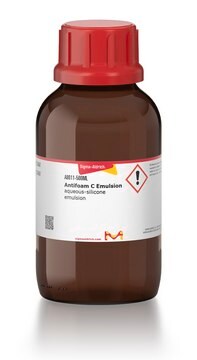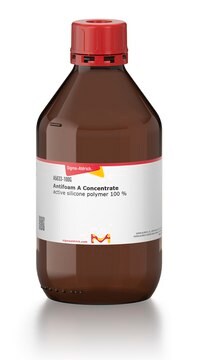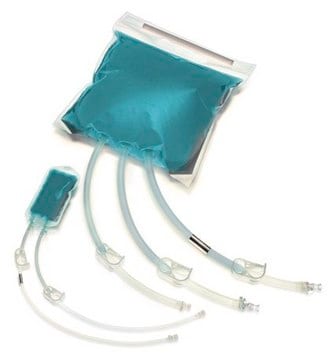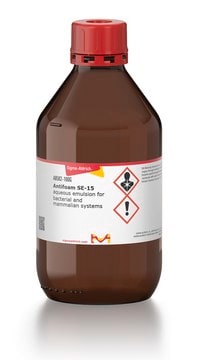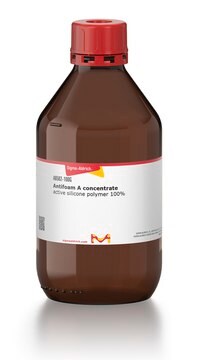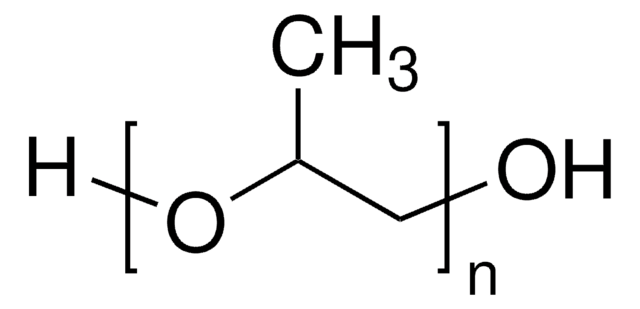A6426
Antifoam 204
mixture of organic polyether dispersions
Synonym(s):
organic antifoam
Sign Into View Organizational & Contract Pricing
All Photos(1)
About This Item
Recommended Products
biological source
synthetic
Quality Level
form
liquid
technique(s)
microbiological culture: suitable
viscosity
400 cP(lit.)
density
1.01 g/cm3 at 25 °C (lit.)
storage temp.
room temp
Looking for similar products? Visit Product Comparison Guide
Related Categories
General description
Antifoam function as an effective foam suppressor. Antifoam 204 contains 100% active components and is a mixture of organic non-silicone polypropylene-based polyether dispersions. It does not contain mineral oil. Antifoam 204 can itself be considered a surfactant, but it contains no other surfactants. This product is synthetic and not derived from animal or plant sources. Antifoam 204 can be sterilized repeatedly. The flow properties of Antifoam 204 are such that it can be pumped to a fermenter on an as-needed basis. For use in microbiological media, Sigma recommends a starting concentration of between 0.005% and 0.01%.
Application
Antifoam 204 has been used:
- to suppress bubbling in thylakoid solutions during intramembrane isoprene quantification
- as a component of fed-batch continuous culture fermentation medium
- to suppress severe foaming in fermenter
Features and Benefits
- Highly versatile surfactant for your cell biology and biochemical research
- Suitable for microbiological culture
Other Notes
Contains 100% active components and is a mixture of non-silicone organic defoamers in a polyol dispersion. Can be sterilized repeatedly.
For additional information on our range of Biochemicals, please complete this form.
Storage Class Code
10 - Combustible liquids
WGK
WGK 3
Flash Point(F)
Not applicable
Flash Point(C)
Not applicable
Choose from one of the most recent versions:
Already Own This Product?
Find documentation for the products that you have recently purchased in the Document Library.
Customers Also Viewed
Physiology of Aspergillus niger in oxygen-limited continuous cultures: Influence of aeration, carbon source concentration and dilution rate
Diano A, et al.
Biotechnology and Bioengineering, 103(5), 956-965 (2009)
Ultrasound-assisted fermentation enhances bioethanol productivity
Sulaiman AZ, et al.
Biochemical Engineering Journal, 54(3), 141-150 (2011)
A novel noncovalent complex of chorismate mutase and DAHP synthase from Mycobacterium tuberculosis: protein purification, crystallization and X-ray diffraction analysis
M Okvist, et al.
Acta Crystallographica Section F, Structural Biology and Crystallization Communications, 65(10), 1048-1052 (2009)
Concentration of isoprene in artificial and thylakoid membranes
Harvey CM, et al.
Journal of Bioenergetics and Biomembranes, 47(5), 419-429 (2015)
Erin E Johnson et al.
Bioresource technology, 209, 1-7 (2016-03-08)
Waste crude glycerol from biodiesel production can be used to produce biobutanol using Clostridium pasteurianum with the main products being n-butanol, 1,3-propanediol (PDO) and ethanol. There has been much discrepancy and mystery around the cause and effect of process parameters
Our team of scientists has experience in all areas of research including Life Science, Material Science, Chemical Synthesis, Chromatography, Analytical and many others.
Contact Technical Service
